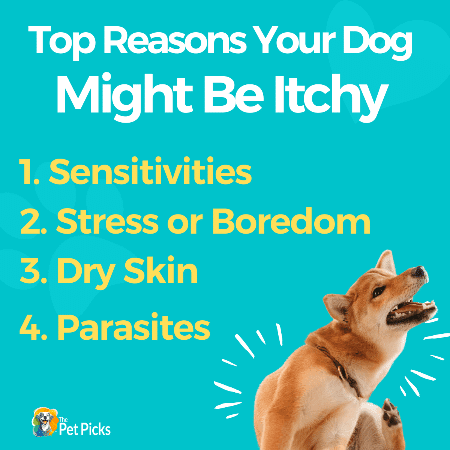Why Is My Dog Always Scratching?
Tired of guessing why your dog is always itching? Our straightforward guide, “Stop Guessing: Find Out What's Bothering Your Furry Friend”‘ offers insights into how sensitivity testing can reveal the causes and lead to a happier, healthier life for your pet
Your dog's constant scratching can disrupt both their comfort and your peace. Let's quickly dive into why this might be happening and how you can help them find relief.
Top Reasons Your Dog Might Be Itchy:

The Itch They Can't Scratch Away: Common Culprits
Sensitivities: More Than Just a Seasonal Sniffle
Sensitivities stand as one of the primary villains in the tale of your dog's discomfort. These can be food-related, environmental (pollen, dust), or even due to direct contact with certain materials. Like humans, dogs react to allergens, but instead of sneezing, their symptoms often manifest through their skin.
Parasites: Unwelcome Guests
Fleas, ticks, and mites are notorious for making a home in your dog's coat. Even with regular grooming, these pesky parasites can be hard to spot but quick to cause irritation. A single flea bite can lead to excessive scratching, especially in dogs allergic to flea saliva.
Dry Skin: A Rough Patch
Various factors, including the weather, nutritional deficiencies, or even over-bathing, can strip your dog's skin of essential oils, leading to dryness and irritation. This often results in a dog scratching to alleviate the discomfort.
Psychological Factors: Stress and Boredom
Scratching can also be a manifestation of psychological distress. Dogs experiencing anxiety, stress, or boredom may turn to compulsive behaviors such as scratching or licking as a coping mechanism.
Scratching the Surface: First Steps to Relief
Vet Visit: The Starting Line
An essential first step in addressing your dog's scratching is consulting with a veterinarian. They can help identify the root cause and recommend a tailored treatment plan.
Sensitivity Testing: Uncover the Hidden Triggers
Performing a sensitivity test can be a game-changer in understanding what's causing your dog's discomfort. These tests can identify specific triggers, such as certain foods or environmental factors, allowing for more targeted interventions.
Diet and Nutrition: Fuel for Health
Sometimes, the solution lies in your dog's bowl. Nutritional adjustments or supplements might be necessary, especially if dry skin or food sensitivities are to blame.
Environmental Adjustments: A Comfortable Haven
Creating a stress-free environment and ensuring your dog has plenty of physical and mental stimulation can alleviate psychological discomfort, reducing the need to scratch.
First Steps to Relief

Find Out What's Making Your Dog Itch: A Simple Guide to Sensitivity Testing
Is your dog always scratching? See how a quick sensitivity test can help. Check out our easy guide, “Stop Guessing: Find Out What's Bothering Your Furry Friend”, to get answers leading to a happier, healthier life for your pet.
FAQs:
What are the most common sensitivities in dogs?
Dogs can be sensitive to a variety of things, including certain foods, pollen, dust mites, and even fabrics. Identifying these sensitivities is crucial for effective management.
How can I tell if my dog's scratching is due to sensitivities?
Look for other signs of sensitivities, such as gastrointestinal upset, skin irritation, or respiratory issues. A sensitivity test can provide definitive answers.
Are sensitivity tests for dogs reliable?
Yes, sensitivity tests can accurately identify a wide range of food and environmental sensitivities, guiding more effective management strategies.
Can changing my dog's diet reduce scratching?
If sensitivities are food-related, adjusting your dog's diet can significantly reduce or eliminate scratching. Consult with a vet for a tailored dietary plan.
How can I prevent my dog from developing sensitivities?
While not all sensitivities can be prevented, maintaining a healthy diet, regular grooming, and minimizing exposure to known irritants can help reduce the risk.
How can I prevent my dog from getting itchy?
Regular grooming, a balanced diet, and keeping your home clean can make a big difference.
What should I do if my dog won't stop scratching?
Consult with a vet to rule out any serious issues and consider a sensitivity test to identify triggers.
A Loving Reminder
The information provided at ThePetPicks.com is based on research and expertise, aiming to enhance the bond between you and your dog. However, it’s essential to remember that every dog is unique. Always consult with professionals, like veterinarians or trainers, for specific concerns or advice. At ThePetPicks.com, we believe in “Trust Born from Love,” and we encourage every pet parent to make informed decisions rooted in love and care.

